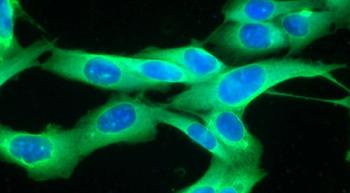
The USPSTF recommends that colorectal cancer screening start at age 45.

There are resources for patients who are struggling to pay for their treatment, but nurses must initiate the conversation.

PLX8394, a next-generation BRAF inhibitor, in combination with cobicistat (Tybost) was found to demonstrate encouraging clinical activity with an acceptable safety profile in patients with BRAF-mutated, refractory solid tumors, according to results from a phase 1/2 trial (NCT02428712) presented during the 32nd EORTC-NCI-AACR Symposium on Molecular Targets and Therapeutics.

The investigational wholly-owned allogeneic chimeric antigen receptor T-cell therapy CTX110 demonstrated dose-dependent efficacy and responses in patients with relapsed/refractory CD19-positive B-cell malignancies.

Afatinib (Gilotrif) was found to be effective when used in Asian and non-Asian patients with non–small cell lung cancer (NSCLC) with major uncommon and compound EGFR mutations, irrespective of ethnicity, according to results from a pooled analysis presented during the 2020 IASLC North America Conference on Lung Cancer.

The FDA approval of pembrolizumab (Keytruda) for use in select adult and pediatric patients with unresectable or metastatic solid tumors that are tumor mutational burden (TMB)-high, has both generated a lot of excitement and been hotly debated, according to Vivek Subbiah, MD.

Being hospitalized for cancer can be a frightening experience for a child, but a friendly and approachable nurse can make all the difference.

Robotic-assisted radical prostatectomy was shown to achieve early return of urinary continence without a negative impact on complications and cancer outcomes among men with localized prostate cancer.

An expert discusses recent advancements in the mantle cell lymphoma space.

Treat the cancer, as well as the patient who has cancer, says Linda Bohannon, RN, BSN, MSM.

The FDA has granted osimertinib (Tagrisso) a priority review designation to a supplemental new drug application for the adjuvant treatment of patients with early-stage EGFR-mutated non–small cell lung cancer (NSCLC) following complete tumor resection with curative intent.


The FDA has granted a priority review designation to a supplemental biologics license application and supplemental new drug application for nivolumab (Opdivo) plus cabozantinib (Cabometyx) for the treatment of patients with advanced renal cell carcinoma.

TP53 was found to be the only gene with a germline de novo pathogenic or likely pathogenic variant in pediatric patients with osteosarcoma, according to findings from the Children’s Oncology Group that were published in JCO Precision Oncology.

It is imperative that patients diagnosed with blood cancer undergo the proper molecular testing, one expert says.

The FDA approved venetoclax plus azacitadine, decitabine, or low-dose cytarabine for the treatment of patients with newly diagnosed acute myeloid leukemia.

Oncology nurses are key players in promoting health heart practices after a patient finishes cancer treatment.

Clinical trials should not be viewed as a last resort for patients with metastatic pancreatic cancer, explained Allyson Ocean, MD, who added that even frontline standards of care should be considered after exhausting all available study options.

The FDA approved pembrolizumab for the treatment of adults with relapsed or refractory classical Hodgkin lymphoma.

While CAR T-cell therapy is causing landmark changes to difficult-to-treat blood cancer populations, most patients have experienced some adverse events in clinical trials.

A rolling submission of a new drug application (NDA) for the JAK2/FLT3 inhibitor pacritinib has been initiated for patients with myelofibrosis and severe thrombocytopenia defined as platelet counts of less than 50,000 μL.

Although many patients will eventually relapse, the first remission is the deepest, according to one expert.

Maintaining sexual function is often low on the list of priorities for a woman recently diagnosed with a gynecologic cancer, but raising the subject early in her treatment course may make the patient more willing to engage in a discussion as her care progresses, according to Don S. Dizon, MD, who specializes in survivorship issues.

Nurses need to know which patients are at risk and the tools to use to diagnose cardiac toxicities.

The FDA has granted an orphan drug designation and rare pediatric disease designation to the bispecific antibody nivatrotamab for the treatment of patients with neuroblastoma, according to an announcement from Y-mAbs Therapeutics, Inc.

Black and Hispanic patients with cancer, as well as people with blood cancers, showed higher rates of COVID-19 diagnoses than the general cancer population.

Following preliminary review of the data submitted for the agent, the regulatory agency determined that certain portions of the Chemistry, Manufacturing, and Control (CMC) module and the Clinical module of the application require further detail. However, no non-clinical data have been requested.

It is important that clinicians discuss weight gain with breast cancer survivors, but a one-size-fits-all approach won’t work for this topic.

Take our survey and tell us how your voice is heard, and where nurses need to be a bigger part of the conversation.

Longer-term data demonstrated that treatment with the radiopharmaceutical Lutathera (lutetium-177 dotatate) continued to show low rates of toxicity among patients with somatostatin receptor–positive neuroendocrine tumors (NETs), said Edward M. Wolin, MD, who added that the positive findings open the potential for novel combinations with the agent.